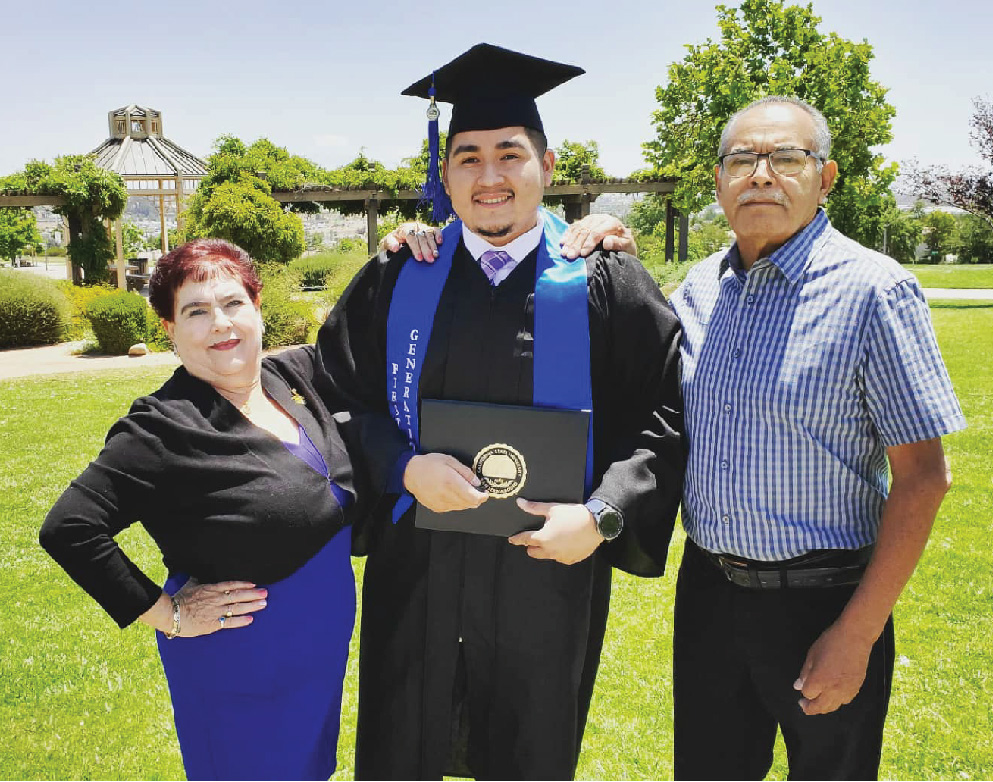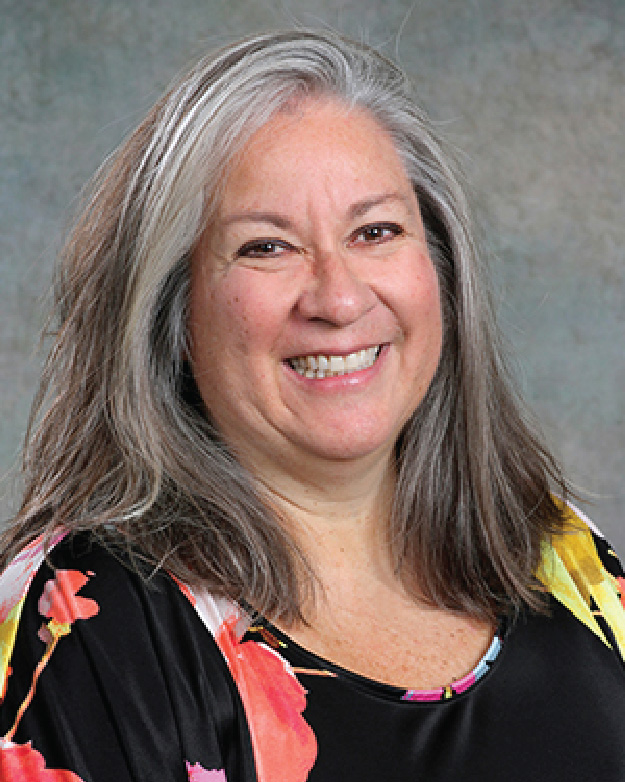First-Gen Stories
Stories are important because they remind us that we are not alone and that we can overcome our challenges just like others. Read some stories from CBU students, staff, and faculty, who were the first in their families to graduate college. If they did it, you can, too.
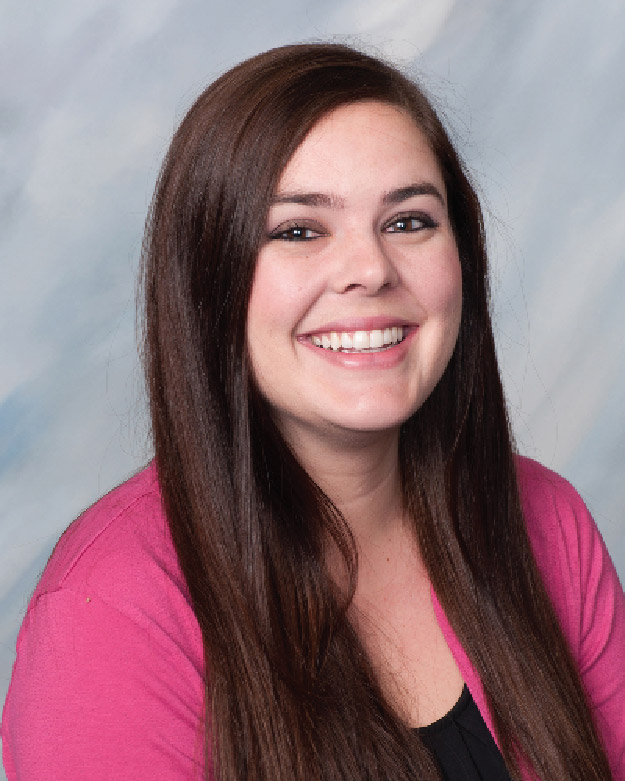
Grace
Majored in Psychology
Changed her major once
Lived at home
Grace's Story:
My older sister and I attended our university at the same time. We were first-generation
college students who were lucky enough to navigate the experience together. A college
education can transform your life and open up so many opportunities, which I have
personally witnessed. Our dad even went on to earn his college degree after watching
his daughters walk across the stage at commencement! Now, I'm working on my doctorate
while directing CBU's Student Success Coaches.
Advice for Students:
Ask questions! Navigating college may sometimes be complicated, but CBU staff and
faculty want to assist you and need to know when you are feeling lost or overwhelmed.
Advice for Parents:
Encourage your student to ask questions, get plugged into resources, and help them
to persevere when things become challenging.
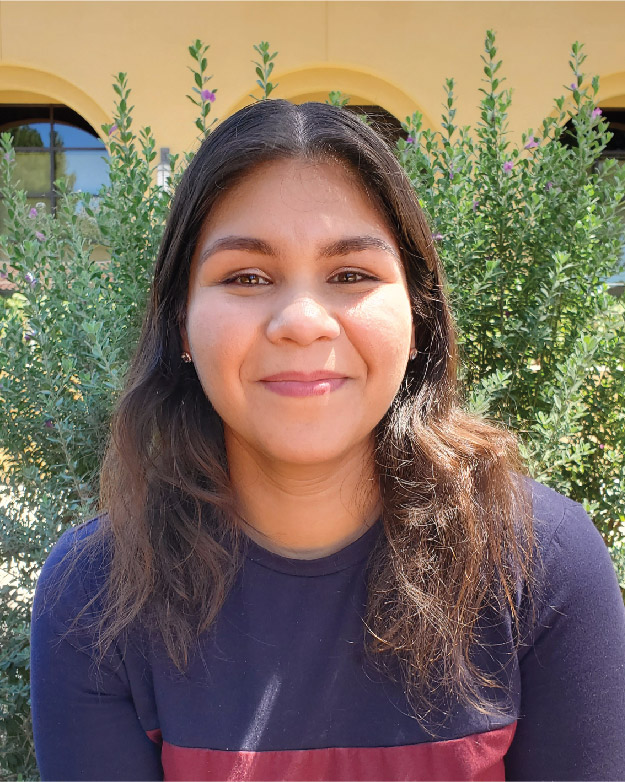
Heidi
Majored in Anthropology
Changed her major once
Lived on campus
Heidi's Story:
Before I attended college, my understanding of college was limited. My parents taught
me the importance of a college degree as a part of the American Dream and a gateway
to a good job and future, but I was the first person in my family to attend college.
Since my parents never fully advanced their education, their support was limited during
my undergraduate education, often taking the form of short motivational phrases in
Spanish: echale ganas ("give it all you've got") andponte las pilas("put in your batteries"). Although my parents couldn't offer much else, I was blessed
to find other wonderful mentors who helped me to navigate my first year. After four
years of college, I was proud to present my hard-earned degree to my Spanish-speaking
parents. Now, I am working towards a Master of Science in Higher Education Leadership
and Student Development at CBU.
Advice for Students:
Get familiar with the university in every way you can. Walk around campus to find
your classes before the first day and browse the school's website to learn about the
services they offer. But most importantly, ask for help! CBU has amazing staff and
faculty who are eager to help you succeed.
Advice for Parents:
Ask a lot of questions and be curious about your student's learning experience. Do
not do what my parents did: they only showed up on my graduation day. You, as parents,
are the first teachers and the first mentors that your student has. It is essential
to be present, supportive, and empathetic.
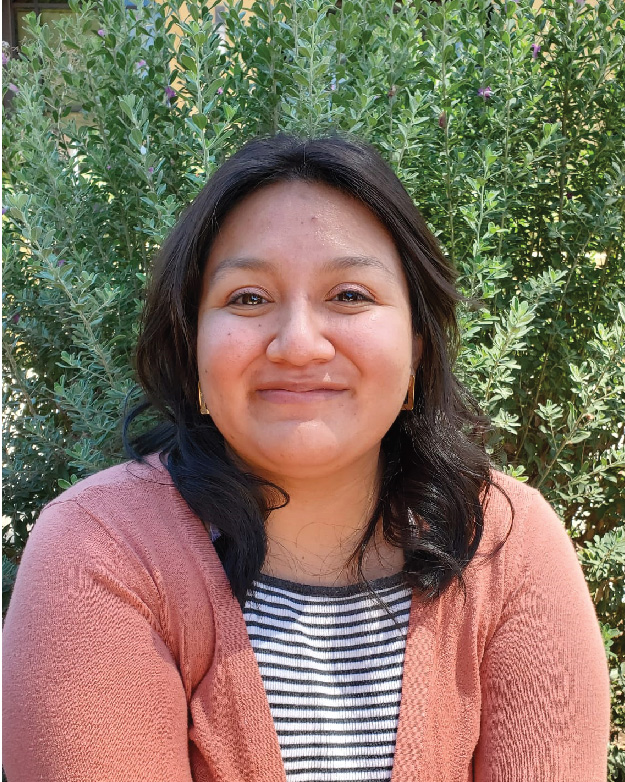
Brenda
Majored in Liberal Studies
Did not change her major
Lived on campus
Brenda's Story:
As a first-gen student, I had to figure out my educational trajectory on my own. I
looked for and joined programs that would help me find my way through college. Finding
the help and support I needed made me feel like I was a part of campus.
Advice for Students:
My message to students is that they are not alone. Never be afraid to ask for help
because there will be someone more than happy to help and guide you!
Advice for Parents:
My message to parents is to be open with your children. Tell them your story. Although
sometimes it may be difficult, or you do not understand what they are going through,
be there for them.
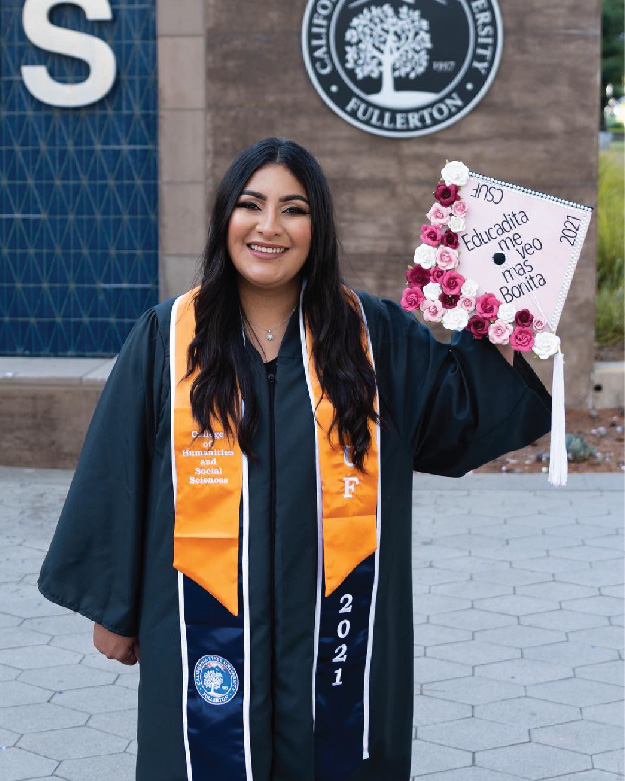
Paola
Majored in Sociology
Did not change her major
Lived at home
Paola's Story:
I went into college with no idea of what college was all about. I learned to register
for classes by myself. I wasn’t aware of any resources back then. I literally relied
on Google to give me the answers to all my questions. I was a commuter and felt like
I didn’t belong there. My parents didn’t even graduate high school in Mexico. I had
to figure out my whole college experience by myself and had to advocate for my own
personal needs.
Advice for Students:
The advice I would give to a first-gen college student is always to ask questions.
Never try to figure out college by yourself. It won’t be fun. Meet with your academic
advisors each semester to make sure you are taking the right classes and not wasting
time. Go to the writing center or tutoring center to get the academic help you need.
And learn to advocate for yourself and your needs.
Advice for Parents:
I would advise parents to attend orientation with their students, if possible, to
find out about programs and events. Be patient with your student and yourselves because
college is a learning experience for everyone. And just be a great support system
for your student.
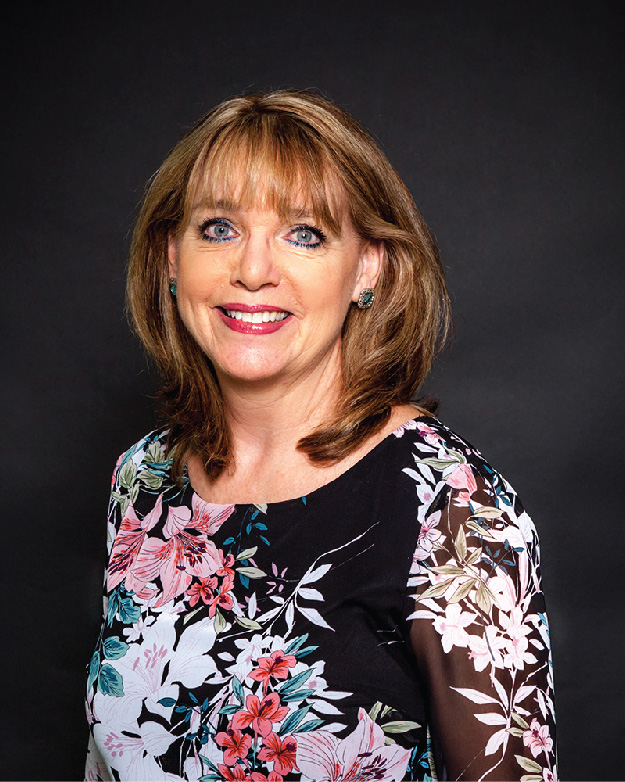
Debra
Majored in Nursing
Did not change her major
Lived at home
Debra's Story:
When I started college, the demands on my life were nearly impossible. Going back
to school was very difficult after being out of the system for so long. It took two
years of prerequisites before I could complete my 2-year nursing degree. This gave
me the strength to branch out on my own and eventually go back for my bachelor's degree,
something that no one in my family had ever accomplished. With that degree, I worked
full-time in critical care and started working at a community college with nursing
students. Teaching became my passion, so I decided to teach full-time and leave bedside
nursing, which meant it was time to go back to school for a master's degree and obtain
a full-time grant position at a community college teaching ADN students. With the
housing crisis several years back and the grants pulled, I lost my position, but God
opened the doors for a professorship at CBU for a new nursing program, which required
a doctorate. After five long years, I now have a Ph.D. in nursing and encourage others
that while the road may be difficult, nothing is impossible with God.
Advice for Students:
Never give up. God has a plan for your life. God sees your tears and your journey.
Be in the center of His will, and He will give you the strength to finish to the end.
Advice for Parents:
Encourage those who are accomplishing what feels like the impossible. Lighten their
load as you are able. Take over the cleaning chores, care for the kids, provide a
quiet respite to study, and pray for their success and well-being.

Duncan
Majored in Art
Did not change his major
Lived at home
Duncan's Story:
It felt like a rite of passage when I first began attending my local community college.
Although my parents were pleased enough that I was attempting to go somewhere in life,
I rarely had any guidance and so floundered on for a few years before disengaging
from higher ed. After marrying, I decided to return to college and finish my undergraduate
and graduate degrees in studio art. Achieving these degrees has made an incredible
difference in my personal and professional life.
Advice for Students:
Be brave and take some risks. Work hard and focus. Trust God for everything.
Advice for Parents:
Don't be afraid to have your son or daughter be changed by their experience; they
will grow.
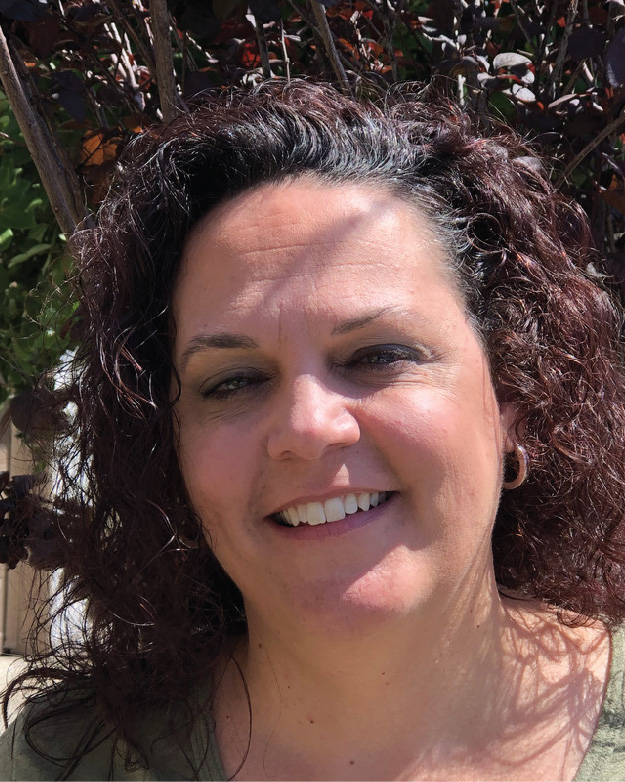
Angela
Majored in Nursing
Changed her major once
Lived on campus
Angela's Story:
I was ill-prepared for the workload, and living on my own for the first time, I had
no idea how to balance study and play. When I started to have academic trouble, I
did not know how to ask for help and just got farther and farther behind, ultimately
ending up on academic probation. This actually saved me because it put advisors in
my life who forced me to make some hard choices about study time and playtime. I really
had to dig in and rely on help to bring my grades up.
Advice for Students:
Use the resources available to you, such as the Office of Student Success and the
Writing Center. Even if you don't think you need them, they can make a difference.
Stay organized and try to find a balance between study and play. You need both, but
your goal is to graduate on time!
Advice for Parents:
Your student really is as busy as they say they are. When they say, "I can't because
I have to study," believe them. The workload in college is much more than in high
school, and the expectation is students will get it done in a timely manner on their
own. Due dates are often not set weekly as in high school. Many times there is just
a big list of assignments and reading with strict deadlines, and it is up to the student
to figure out how to manage their time.
Arnold
Majored in Sociology
Did not change his major
Lived at home
Arnold's Story:
I went into college not knowing what I wanted to pursue, and I did not know what I
needed to do regarding classes and financial aid. Little by little, I began to learn
about requirements and deadlines, and eventually decided on a major in my third year
of college. Within those three years, I was placed on academic probation, which was
the first time I had heard the term. After I appealed my academic probation and got
it approved, I knew I had to do something different. I began to ask questions and
find resources on my own. I got involved in a student group that helped me develop
my leadership skills and guided me far beyond my community college graduation.
Advice for Students:
Do not be afraid to ask questions. Seek out resources. CBU is here to help you. Get
involved. It's an excellent opportunity to network and begin developing leadership
skills.
Advice for Parents:
Be a support system for your student. There are some things that college can help
them with, but other times, it requires support from outside the institution.
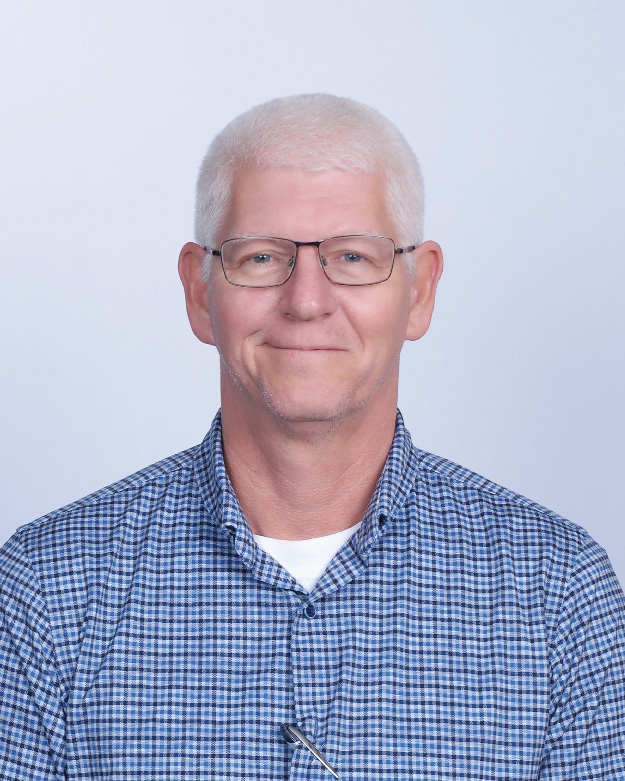
Henry
Majored in Microbiology
Changed his major 2+ times
Lived on campus
Henry's Story:
I started out in a trade and joined the family company in contracting. Later, after
accepting Jesus Christ as my Lord and Savior, I had a yearning to serve in a different
capacity. But growing up, higher education was never a topic at home and was not considered
an option in our household. Then, add in the belief that I was not smart enough and
that I would have to take several high school courses over again. Extended family
members thought going to college was a crazy idea. But with two children, our first
home, and a career, I applied to school and got my degree.
Advice for Students:
Your heart's desire is fundamental to the decision. It will impact the way you approach
your education and what you will take away from it. You can do it. It is a significant
investment of time, money, and effort. But what you take away can be worth it. There
is far more than you can imagine.
Advice for Parents:
You can never give enough support and encouragement. Be a good listener. It is hard
to believe in yourself when others may not, so help them believe in themselves.
Elaine
Majored in Theatre Arts
Did not change her major
Lived on campus
Elaine's Story:
Desire alone may not always be enough to overcome the challenges of college. I am
grateful to the mentors in my life who were willing and available to assist me. Attending
a small private college was definitely an adjustment to what seemed like a sea of
students coming from households whose parents seemed to be extremely wealthy professionals.
I certainly experienced imposter syndrome at times, but I was able to find my comfort
through meeting others from different cultures, countries, and ethnicities. It was
only later after my undergraduate experience that these college experiences would
influence and shape my love for travel, marry a person with the same goals and aspirations
as me, and now live a life that is full of amazing and beautiful experiences. I would
likely not have grown and developed into who I am today if not for having walked through
those moments of uncertainty, fear, and discomfort.
Advice for Students:
My advice to first-generation students is to trust in your abilities and allow yourself
the permission to seek guidance and mentors who want to assist you and help you in
your journey. You are deserving and worthy. There are gems of experiences that are
actual gifts if you allow yourself to believe and trust that you belong "right where
you are in every moment" of a new and unfamiliar journey. If He brought you to it,
He will see you through it!
Advice for Parents:
In reflecting on my own journey as a first-year student away from home, parents and
family members need to be patient and faithful. In my first year, when I did not call
home because of all of the activities during orientation, my family was hurt, and
I tried to explain how busy orientation week was and how acclimating to the new paradigm
was overwhelming. Trust in their love and allow them the space to grow and develop
as individuals amongst new peers.
Noemi
Majored in Social Work
Changed her major 1 time
Lived at home
Noemi's Story:
It was scary. I did feel like I belonged, but I had no idea how to navigate any part
of college. Everything from admissions to classroom language seemed foreign to me.
I had no one to help me navigate challenges until I met other first-gen students like
me. So, I followed their lead. I met them at a Latino Union club, and it was there
that I got the resources I needed and started to make helpful connections to become
successful in college.
Advice for Students:
Join an extracurricular activity. Make friends and ask a ton of questions. If your
friends can't help you, reach out to a staff or faculty member and be honest with
them about your needs.
Advice for Parents:
There are many ways you can support your student even if you did not go to college.
Continue to encourage them, feed them, support them when they have to do hard things,
allow them to have fewer responsibilities at home so they can study, and make coffee
for them during those late-night study sessions. Most of all, give them words of affirmation.

Zachary
Majored in Theatre
Changed his major 2+ times
Lived on campus
Zachary's Story:
I grew up in the southwest but always wanted to study marine biology. So my first
year was spent at a small university in Hawaii. I quickly learned that the field was
not where I was supposed to be. As a first-gen student, changing the "plan" can be
overwhelming at first. I had to be continually reassured by my family that it was
ok not to have my entire future figured out in the first year. The more I pressed
into the things I was passionate about, the more I was able to trust God's plan for
my life and learn how to let go of the idea that I could do it on my own.
Advice for Students:
Do not be discouraged if you don't feel confident with things in your first year.
It can take time to gain your bearings, find your communities, and settle on a major.
Advice for Parents:
Set a regular day and time for checking in. Students will have new schedules and routines
they will be navigating, and setting aside a little time to touch base on a regular
basis can be edifying for both the student and their families.
Tom
Majored in Chemistry
Changed his major 1 time
Lived on campus
Tom's Story:
As a first-generation college student, I didn’t know a lot about higher education
before going to college. I personally knew very few college graduates (mostly just
my teachers in school), and I didn’t know much about different majors, college experiences,
or careers that a college education could prepare one for. I just knew that since
I did well in high school, everyone told me I should go to college. My parents were
supportive, but since neither of them went to college, they were learning about everything
at the same time as I was. I ended up going to a college because it was close to a
good fishing lake. (I know! Not the best way to choose a college, especially since
I didn’t have much time for fishing while in college!) That first semester was really
tough. I got the lowest grades I had ever received and thought about dropping out
several times. It wasn’t until I started to make friends in my classes that I began
to think that college was for me. Then, during my second semester, I asked a professor
for a letter of recommendation for a scholarship when I was thinking about changing
majors. He not only gave me the letter but also offered me a student worker job, and
since I came from a lower-income working-class family and I needed to help pay for
my college education, this was a real blessing. That initial job in my department
led to building other connections, and I never looked back.
Advice for Students:
CBU is a very welcoming community with a lot of clubs, activities, and events on and
off campus. I would encourage first-gen college students, and especially commuter
students, to make efforts to get involved beyond taking classes. It is definitely
important to do well in classes, but it is also important to build friendships and
community. Attend events for new students in your major and look for events on campus
that you are interested in. I know that a lot of first-gen students need to work to
pay for college but try to attend evening events on campus when you can. Make friends
in your major and get to know a faculty or staff member who can be a mentor to you.
Remember – you are not alone!
Advice for Parents:
For many first-gen college students, there is a struggle between being a college student
and the expectations that their family puts on them. Parents should understand that
college is usually harder than high school, so your student may not have much free
time, time to work, or even time to attend to family responsibilities. I have had
many students who have expressed how this struggle is pulling them in different directions
and, because of this, struggle with their studies and mental health. Students will
need the support of family members but also space to grow and develop as individuals.
Their interests and priorities may change, but this does not mean they are turning
their backs on their families.

